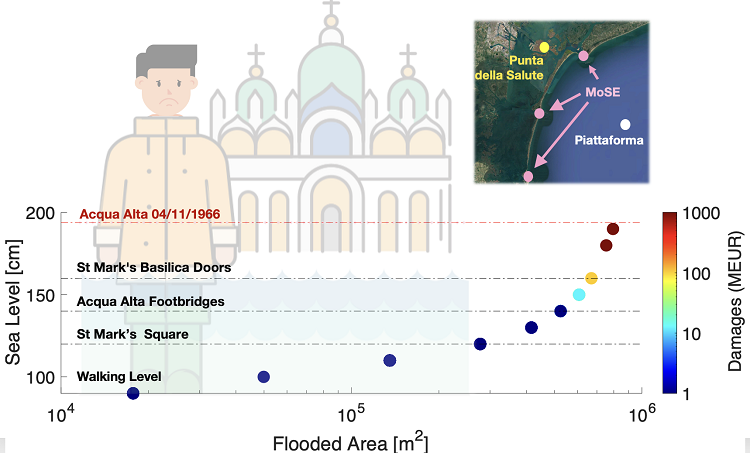Linking Acqua Alta Events to Mediterranean Cyclones in Venice
Acqua Alta events in Venice, notably the catastrophic ones in 1966, 2008, 2018, and 2019, have inflicted substantial harm on the city’s cultural and economic heritage, including the iconic St. Mark’s Basilica, historic shops, and beloved businesses like Caffè Florian. These increasingly frequent and severe floods have left a lasting impact on Venice’s cultural and economic legacy. paper holds particular significance in light of the escalating threat posed by Acqua Alta events in Venice, which have increasingly damaged the city’s invaluable cultural and economic heritage.
By investigating the attribution of these events to climate change and evaluating the efficacy of the MoSE adaptation system, the research by D. Faranda (LSCE-IPSL) and colleagues from France and Italy provides essential insights that can inform effective strategies for safeguarding Venice and similar coastal cities against future climate challenges.
This research employs an innovative approach by utilizing analogues of atmospheric patterns to scrutinize four notable Acqua Alta events in the Venice lagoon, specifically those connected with intense Mediterranean cyclones that transpired in 1966, 2008, 2018, and 2019. The findings provide compelling evidence that modifications in atmospheric circulation, while not solely attributable to human activities, are undeniably linked to the increased severity of these events, thereby illuminating the vulnerability of Venice to the impacts of climate change. Furthermore, the study conducts a comprehensive assessment of the MoSE system, a crucial adaptation infrastructure designed to mitigate flooding in Venice, and underscores its effectiveness in protecting the city against events with historical analogues, particularly those akin to the catastrophic 1966 flood.

La figure montre la zone inondée en fonction des dommages estimés (cercles colorés remplis). Les lignes noires horizontales en pointillés marquent les niveaux d’inondation significatifs correspondant à l’inondation par le niveau de la mer de la place St. Marc (120 cm), le niveau auquel des ponts alimentaires sont nécessaires pour traverser la place (140 cm), et le niveau auquel l’eau pénétrera dans la basilique Saint-Marc (160 cm). La ligne rouge en pointillés marque le niveau atteint par l’événement du 04/11/1966 connu sous le nom de « Grande Inondation de Venise » et étudié dans ce travail. Adapté de https://www.comune.venezia.it/it/content/venezia-e-lacqua-alta
Despite the valuable insights this research offers into the attribution and consequences of extreme Acqua Alta events, it conscientiously acknowledges several limitations that warrant consideration. Notably, the constraints related to data availability underscore the need for further research endeavors to enhance our understanding and better inform the design of effective mitigation and adaptation strategies for unprecedented and more frequent extreme events in the future.
This study marks a significant milestone in advancing our comprehension of the repercussions associated with extreme events in coastal cities, serving as a robust foundation for future research efforts. It also underscores the significance of not only comprehending the driving forces behind these extreme events but also quantifying the changes and assessing their impacts, thereby contributing to the ongoing discourse on climate adaptation and resilience strategies in the face of mounting climate-related challenges.
More
Bibliography
Faranda, D., Ginesta, M., Alberti, T., Coppola E., Anzidei, M. Attributing Venice Acqua Alta events to a changing climate and evaluating the efficacy of MoSE adaptation strategy. npj Clim Atmos Sci6, 181 (2023). https://doi.org/10.1038/s41612-023-00513-0






